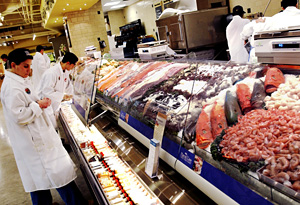Environmentally Friendly Seafood? There's an App for That

Photo: Getty Images
The conflicts can seem maddening: Eat fish—it's great for your health. Don't eat fish—it's full of mercury, which is bad for you. People who eat fish live longer and their brains stay sharp. But overfishing is killing our rivers and oceans. How is a regular person supposed to keep it all straight?
From aboard the Plastiki—a boat made of 12,500 recycled plastic bottles that is sailing across the Pacific—Graham Hill, founder of TreeHugger.com, shares the idea that answers that question.
We're busy people, and we're generally suffering from information overload. So when we need to pick out a new phone, or TV or the latest gizmo, most of us have a friend we look to. We give her the lowdown on our needs, and she tells us what to go for. We trust her... done...easy.From aboard the Plastiki—a boat made of 12,500 recycled plastic bottles that is sailing across the Pacific—Graham Hill, founder of TreeHugger.com, shares the idea that answers that question.
It would be great if we had guides like this for most things in life, wouldn't it? Well, unfortunately, we're not quite there on most fronts. But let me share one area in which we are. Seafood.
The news is perpetually touting the latest report about omega 3, and we know seafood can be great for our health. Fish is known to be an excellent low-fat food, a great protein source, it and has plenty of vitamins and minerals. Fish oil includes omega-3 fatty acids that are great for your brain and protect against heart disease, stroke and heart attacks.
Many of us also know our oceans are not in great shape. In fact, from my recent time at the Mission Blue conference and on the Plastiki, I have come to learn that our oceans have truly been decimated. Two-thirds of them are out of any one nation's control and therefore are essentially unregulated. Add to this Wild West scenario the fact that we insanely subsidize our two-and-a-half-times too-large fishing industry to the tune of $35 billion a year, and you can understand why many predict the end of our fisheries by 2050.
So for your personal health and that of the oceans, how can you vote with your dollars?
Remember that helpful techie friend? Here's his marine equivalent, shrunk down to wallet and smart phone size. Known as "the fish cards," they are ready to help you choose healthy and ecological seafood customized for whatever part of the country you live in. They are well researched by experts and presented for you to choose from seafood that is "abundant, well-managed and caught or farmed in environmentally friendly ways."
Download the pocket guide from the Monterey Bay Aquarium at SeafoodWatch.org.
For example, say you live in the Northeast. Here's a trimmed-down version of that area's guide:
Green (Meaning: Go for it!)
Clams
Mussels
Oysters (farmed)
Crab: Dungeness, Stone
Halibut: Pacific+
Lobster: Spiny (US)
Salmon (Alaska wild)+
Scallops: Bay (farmed)
Trout: Rainbow (farmed)
Tuna: Albacore (troll/pole)
Yellow (Meaning: Not great, so try to minimize)
Black Sea Bass
Haddock (hook and line)
Lobster: American/Maine
Oysters (wild)
Scallops: Sea (wild)
Shrimp (U.S., Canada)
Swordfish (U.S.)*
Tuna: Bigeye, Yellowfin (troll/pole)
Red (Meaning: Avoid)
Chilean Sea Bass/Toothfish*
Cod: Atlantic
Crab: King (imported)
Haddock (trawled)
Salmon (farmed, including Atlantic)*
Sharks* and Skates
Shrimp (imported)
Snapper: Red
And to get even fussier, they provide a "Super Green" list as well. This list takes the larger list of sustainable seafood and picks the ones that are healthiest for you because they tend to contain the least environmental contaminants and the most omega 3s. That Northeasterner will find Super Green options like farmed mussels, oysters, rainbow trout and Coho salmon, as well as wild albacore tuna, Pacific sardines and Alaskan salmon.
See, it's just that easy.
Graham Hill, founder of TreeHugger.com, is currently crossing the Pacific on the Plastiki. Learn more at ThePlastiki.org and make a Plastiki pledge at MyPlastiki.com.
Keep Reading:
Take an exclusive photo tour of the Plastiki—and meet the crew
The Plastiki's David de Rothschild thinks Earth needs a new name
Why no matter where you live, you're still a sea creature
Download the pocket guide from the Monterey Bay Aquarium at SeafoodWatch.org.
For example, say you live in the Northeast. Here's a trimmed-down version of that area's guide:
Green (Meaning: Go for it!)
Clams
Mussels
Oysters (farmed)
Crab: Dungeness, Stone
Halibut: Pacific+
Lobster: Spiny (US)
Salmon (Alaska wild)+
Scallops: Bay (farmed)
Trout: Rainbow (farmed)
Tuna: Albacore (troll/pole)
Yellow (Meaning: Not great, so try to minimize)
Black Sea Bass
Haddock (hook and line)
Lobster: American/Maine
Oysters (wild)
Scallops: Sea (wild)
Shrimp (U.S., Canada)
Swordfish (U.S.)*
Tuna: Bigeye, Yellowfin (troll/pole)
Red (Meaning: Avoid)
Chilean Sea Bass/Toothfish*
Cod: Atlantic
Crab: King (imported)
Haddock (trawled)
Salmon (farmed, including Atlantic)*
Sharks* and Skates
Shrimp (imported)
Snapper: Red
And to get even fussier, they provide a "Super Green" list as well. This list takes the larger list of sustainable seafood and picks the ones that are healthiest for you because they tend to contain the least environmental contaminants and the most omega 3s. That Northeasterner will find Super Green options like farmed mussels, oysters, rainbow trout and Coho salmon, as well as wild albacore tuna, Pacific sardines and Alaskan salmon.
See, it's just that easy.
Graham Hill, founder of TreeHugger.com, is currently crossing the Pacific on the Plastiki. Learn more at ThePlastiki.org and make a Plastiki pledge at MyPlastiki.com.
Keep Reading:
Take an exclusive photo tour of the Plastiki—and meet the crew
The Plastiki's David de Rothschild thinks Earth needs a new name
Why no matter where you live, you're still a sea creature



